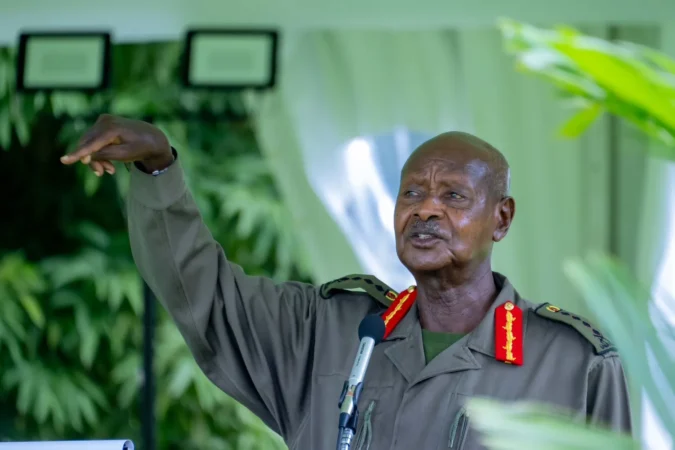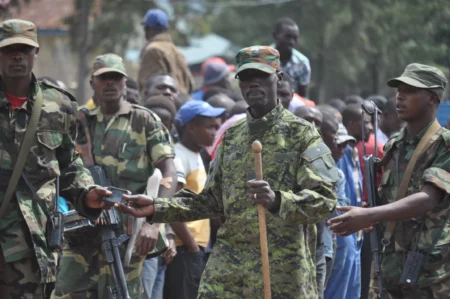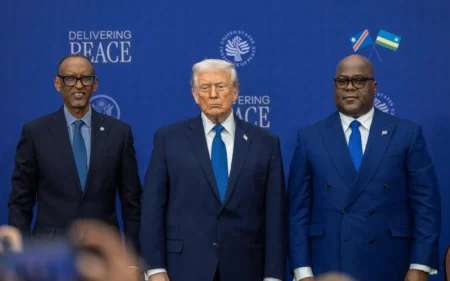WASHINGTON D.C., United States — US President Donald Trump on Wednesday signed a new travel ban, resurrecting a controversial measure from his first term and targeting 12 countries for outright travel prohibitions. The comprehensive directive also includes a partial ban on travelers from an additional seven nations.
Trump stated that the decision was prompted by a recent flamethrower attack on a Jewish protest in Colorado, which US authorities attributed to an individual allegedly in the country illegally.
The newly enacted ban prohibits all travel to the United States by nationals of Afghanistan, Myanmar, Chad, Republic of the Congo, Equatorial Guinea, Eritrea, Haiti, Iran, Libya, Somalia, Sudan, and Yemen.
Additionally, Trump imposed a partial ban on travelers from Burundi, Cuba, Laos, Sierra Leone, Togo, Turkmenistan, and Venezuela, though some temporary work visas for individuals from these countries will be permitted.
The White House confirmed that these bans are set to take effect on Monday.
“The recent terror attack in Boulder, Colorado has underscored the extreme dangers posed to our country by the entry of foreign nationals who are not properly vetted,” Trump asserted in a video message from the Oval Office shared on X. He concluded his statement with a definitive, “We don’t want them.”
Exceptions for major sporting events and Harvard student visa ban
Notably, the new travel restrictions will not apply to athletes participating in the 2026 World Cup, which the United States is co-hosting with Canada and Mexico, nor to those competing in the 2028 Los Angeles Olympics, as specified in Trump’s order.
In a separate announcement on Wednesday, Trump also imposed a ban on visas for foreign students intending to attend Harvard University, intensifying his crackdown on what he perceives as a bastion of liberalism.
The US leader drew parallels between these new measures and the “powerful” ban he implemented on several predominantly Muslim countries during his initial term, a policy that caused widespread travel disruption globally. Trump claimed that the 2017 ban successfully prevented terror attacks in the United States, contrasting it with events that occurred in Europe.
“We will not let what happened in Europe happen in America,” Trump declared. He emphasized, “We cannot have open migration from any country where we cannot safely and reliably vet and screen.”
In response to the announcement, Venezuela swiftly retaliated, warning that the United States itself posed a significant risk as a travel destination.
“Being in the United States is a great risk for anyone, not just for Venezuelans,” stated Venezuela’s Interior Minister Diosdado Cabello, cautioning citizens against travel there.
Trump’s latest travel ban is anticipated to face legal challenges, mirroring the numerous drastic measures undertaken since his swift return to office.
Unveiling the ban and justifications
The White House unveiled the new ban with almost no prior warning, mere minutes after Trump had addressed approximately 3,000 political appointees from his balcony during a celebratory “summer soiree.”
The announcement was also made without reporters present, a departure from his usual practice of making headline-grabbing policy declarations at Oval Office signing ceremonies.
However, rumors of a renewed Trump travel ban had circulated following the Colorado attack, with his administration vowing to pursue “terrorists” residing in the US on visas.
The suspect, Mohammed Sabry Soliman, identified in court documents as an Egyptian national, is alleged to have used firebombs and sprayed burning gasoline at a group gathered on Sunday in support of Israeli hostages held by Hamas.
US Homeland Security officials confirmed that Soliman was in the country illegally, having overstayed a tourist visa, despite having applied for asylum in September 2022.
“President Trump is fulfilling his promise to protect Americans from dangerous foreign actors that want to come to our country and cause us harm,” affirmed White House Deputy Press Secretary Abigail Jackson on X.
Also Read: Trump blocks Harvard from enrolling foreign students, threatens wider crackdown
Trump’s proclamation provided specific justifications for each country included in the ban, asserting its aim to protect the United States from “foreign terrorists and other national security” threats. Notably, Egypt was not among the countries facing travel restrictions.
For Taliban-ruled Afghanistan and the war-torn nations of Libya, Sudan, Somalia, and Yemen, the proclamation cited a lack of “competent” central authorities for passport processing and vetting. Iran, currently engaged in negotiations with the United States regarding a potential nuclear deal, was included due to its designation as a “state sponsor of terrorism,” according to the order.
“The impact of the ban will once again be felt by Americans who were denied the ability to see their loved ones at weddings, funerals, or the birth of a child,” commented Jamal Abdi, president of the National Iranian American Council.
For most of the other affected countries, Trump’s order cited an elevated likelihood of individuals overstaying their visas.






